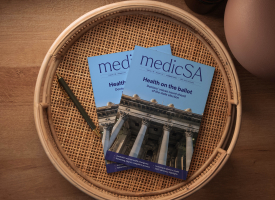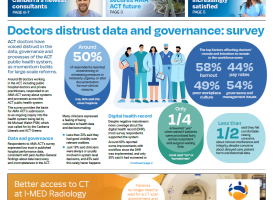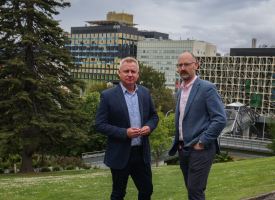Transcript - AMA calls for national plan to combat threat of Omicron
Transcript: AMA President, Dr Omar Khorshid, Perth press conference, Tuesday, 21 December 2021
Subject: AMA calls for national plan to combat threat of Omicron
OMAR KHORSHID: The Australian Medical Association is today calling on our national leaders as they come together at National Cabinet tomorrow to make a national plan for dealing with Omicron. This threat is real. It is spreading around the globe like wildfire, and it is causing disruptions to lives and economies in Europe, and in other countries overseas in ways that we just don't want to see here.
The idea that Omicron is mild is out there in the media. It may be mild, but we just don't know. And now is not the time to be taking risks with people's lives. And of course, with our economies going into next year.
It is a no brainer in the view of the AMA, and in fact, in the view of many experts that have been coming out over the last few days, that sensible measures, sensible measures that do not have significant impacts on people's lives, like wearing masks, like some simple social distancing requirements, density limits in indoor venues are all measures that are absolutely essential to manage Omicron.
They will not destroy the economy, they will not destroy people's Christmas, and they can keep a little bit of a handbrake on Omicron while we learn more about it, and whilst we get our booster program underway.
Now, we're going to hear from the states more and more about the need to bring boosters forwards, and the AMA would generally be supportive of that, but the reality is we just can't get more boosters into arms, because we don't have the capacity through state run vaccination centres, GPs, and pharmacists to actually deliver more boosters than are being done at the moment. So, setting a date of three months will have no significant impact over the current target of five months. And therefore, our message to the states is focus on what you can do.
You can require masks to be worn in indoor venues. You can keep some sensible limits on people getting together in indoor venues to try and minimise the impact of Omicron while we wait for that extra data.
The approach so far by the New South Wales Government in particular is risking lives, is risking an extraordinary impact on the health system into next year, and it just doesn't make sense.
QUESTION: The Premier of New South Wales, Mr Perrottet, and the Prime Minister himself, appear to be resistant to mask mandate. Yes, if you want to, it's pretty much- that's the extent of it. So, if New South Wales is risking lives, so is the Prime Minister?
OMAR KHORSHID: We understand that our leaders don't want to limit the freedoms of Australians, but we've got to remember we're in the middle of a global pandemic that has taken an extraordinary number of lives around the world. So having the courage, having the will to say to people: look, we just need you to do this, like we need you to wear seat belts, like we need you not to drive when you're drunk. We need you to wear a mask, not to protect yourself, but to protect other people in the community. That is what we do. Those are the limits we accept on our freedoms to live in a community, in a society. These are very reasonable steps, and they must be taken now.
QUESTION: If that is so obvious then, why do you think that the New South Wales Premier and the Prime Minister are so resistant to that idea?
OMAR KHORSHID: You'd have to ask those political leaders why they're taking the decisions they're taking. But from an outside view, it seems to me that having given people hope, they don't want to take it away just before Christmas. And I understand that.
It is a difficult thing to say to people that we know we said this is the end of restrictions, this is the end of the pandemic, but it absolutely is not. And to be honest, the best way to avoid lockdowns, to avoid going down those pathways that nobody wants to go down is actually to take Omicron seriously, to bring in some simple measures, like are being used throughout the world in order to manage this pandemic, because living with COVID is not letting it rip, it is not doing absolutely nothing to control its spread.
Living with COVID means sensible measures being taken long term and also being able to flex those measures up and down in order to protect the health system and to keep our economy moving. That was always part of the national plan. It's part of the Doherty modelling. And here we are with a new, more transmissible virus. It's exactly the kind of event that means the approach needs to change.
QUESTION: Some of the state-run clinics around the country, reopened to help with boosters. And should the booster rollout- should we have to rethink around that language, to actually be actually called a third vaccine at this point to change some of the thinking around it?
OMAR KHORSHID: We are waiting on advice as to whether the third dose needs to be part of the core program. I think it's looking more and more likely. But even if we call it a booster for now, the absolute priority must be to get those boosters into arms. And that means maximising our capacity to deliver. That means state run clinics opening up, particularly in those states where they've pulled them back, like Victoria. And it also means our Commonwealth Government reversing its decision to cut the amount it pays both pharmacists and GPs to participate in the booster program and actually properly fund our primary care sector to do everything it can, to pull out all the stops to make sure that there's a vaccine available for everyone who needs it when they need it, because that's not the reality right now.
QUESTION: Should the Government be subsidising rapid antigen tests to make them more affordable, or even free?
OMAR KHORSHID: I understand the main problem with rapid antigen tests, particularly in Sydney, is you actually can't get one. So, making them free is probably not the priority, it's actually access to those tests, and really good advice, too, on how to use them, what they mean, because that's not absolutely obvious to everybody. They're quite a different test to the gold standard PCR test, and their results need to be taken in context. But certainly, if you're symptomatic and if you're going to thinking of going to an event and you really need to know right now, am I infectious? Am I going to put my grandmother at risk on Christmas Day? It'd be great to have access to rapid antigen tests, and unfortunately, access just isn't what it could be at the moment.
QUESTION: Could you just explain what do you mean by even if the booster was given at three months rather than five, that it would have no significant impact?
OMAR KHORSHID: So, what we're talking about there is changing the eligibility for boosters from five months to three months. And where the problem with rolling out boosters is your access to vaccinators, to people who actually put the needle into the arm, that it doesn't matter if you change the eligibility criteria, you won't actually cause your rollout to happen any faster.
What we really need to do is make sure that most vulnerable people, they were the ones who had their booster-their original doses early on in the pandemic, those people need to get their boosters right now. They're the ones who are eligible right now, and we should be focusing on them, using our resources on them because they're the ones most likely to develop severe illness or end up in hospital from COVID.
For the rest of us, I know everyone's desperately keen to get their booster, but changing eligibility doesn't magically mean the rollout is going to go faster. We need to look at those handbrakes, which are the lack of state-run vaccination centres and the lack of capacity in primary care to actually get this done in a very short period of time.
QUESTION: Would you say staffing is the main issue in that regard?
OMAR KHORSHID: Staffing and logistics in a very short turnaround time. We've got to remember that the five-month eligibility only happened just over a week ago, and I know that the distribution centres have been frantically trying to get the vaccines out, to get the orders in from GPs and pharmacists, and get those vaccines out to those practices so they're available for people to have in the last few days before Christmas and of course, into the new year. But all these things take time. It's a massive program, and we just need to be realistic about how quickly we can ramp up that program.
QUESTION: Yeah, I just- sorry. But that aside, New Zealand have just brought, as I understand, they've just come back from five months to four months for the third shot. If we had the capacity, would you like us to see- would you like to see us go into four months, or three months?
OMAR KHORSHID: Our vaccine program is designed by our vaccine experts who are ATAGI, and they are looking at the complexity of the science. Not just as simple as yes, we'd love to get everyone boosted quickly because we've got Omicron coming. But they're also looking at the long-term effectiveness of the vaccines, and the bigger the gap between your vaccinations, actually, the better the immunity that you get.
So, they're looking at all those factors, but of course, they're also looking at the capacity of the system when they make their recommendations. There's a lot of pressure to bring the booster program forward to three months, and I'm certain that if ATAGI think it's a good thing to do, they will make that recommendation to Government and that will be part of the program.
But then we'll have that issue. How do we get millions of doses of vaccines? If we go to three months, straight away you'll have millions more Australians who are eligible for their vaccine booster today. And if we do that, how on earth do we get those millions of doses into arms within a very short period? It's a huge challenge, and that's why it is absolutely critical that we keep working on these other measures, the public health measures, the masks, because that's how we buy ourselves a little bit of time to get these booster doses into arms.
QUESTION: Moderna apparently has announced very good results for its third jab. If you had a choice, would you go Moderna, or to Pfizer for the third one?
OMAR KHORSHID: The strong advice that we've received is that there's no difference between Moderna and Pfizer; that the dose of Moderna that Australia is getting for the booster is half its usual dose. That makes it very, very similar to the Pfizer dose. And the key really, the key message for all Australians is don't worry about which brand of vaccine you're getting.
Just go and get your booster. The quicker you get it, the better protection you're going to have against Omicron, and the quicker we can return to what we're all looking forward to, which is that more normal life.
QUESTION: Some people would like to have that opportunity to choose between different doses. Should they be able to do that?
OMAR KHORSHID: Well, look, people have the right to determine what vaccine gets put in their arms, and they can choose to access one versus the other by determining where they go and get their vaccine. But the medical advice is that these vaccines are pretty much identical. They're the same technology, working on the same protein, working in the same way at a very similar dose. So, it really makes no difference which one you get. You just got to get one as quickly as you can.
QUESTION: The Federal Government was going to hold National Cabinet today, but they put back for a day. Do you understand the reasons for that? And does that perhaps show that they're not taking it as seriously as they should?
OMAR KHORSHID: I hope that actually the change in National Cabinet suggests that they're taking this more seriously, that they need time to get the advice that they need in order to come up with what we're calling for today, which is a national plan. It would be so much better if we can start to do things as a nation rather than each state taking its own course. So, I'm hoping it's a good sign, but of course, time will tell.
QUESTION: How concerned are you about Indigenous vaccination rates in WA?
OMAR KHORSHID: So, throughout the pandemic, we've been very concerned about Indigenous vaccination rates because our Indigenous communities, particularly in those remote areas, are the most vulnerable to harms from COVID.
So, if you combine the most vulnerable population with a low vaccination rate, that's a disaster waiting to happen. And unfortunately, those low vaccination rates mean that those communities are going to be cut off from the rest of the state simply because of that low vaccination rate. So, a real plea, I guess, to everyone out there to stop the misinformation, to stop the lies that are going out there around the vaccine safety. This is the way to protect your community from COVID, from serious illness, from death, and it's a way to connect your community to the rest of the state, and indeed the rest of the country.
QUESTION: The modelling from the WA Government was based on the Delta strain in terms of reopening. Is that outdated now that Omicron has arrived?
OMAR KHORSHID: Unfortunately, the differences that are apparent from Omicron mean that all our modelling is out of date. The original Doherty modelling is out of date. The modelling that most of our state governments have done themselves is out of date. And we just don't have the data around Omicron to do new modelling as yet. We know it's spreading very quickly through previously immune populations, either through infection or vaccination. We know that. But we don't know if it's because it's innately more transmissible or if it's because the previous immunity doesn't work. So, these questions have all got to be answered but the key one is how many people are going to get sick? How many people are going to end up in hospital? And that's the question to which right now we just don't have the answer.
QUESTION: With Scott Morrison saying this morning that he wants the heavy-hand approach of COVID to be over, do you believe that the Prime Minister sees tightening public health restrictions as a policy failure? And is this a concerning public health stance?
OMAR KHORSHID: The AMA's view is that it was always the plan. It was the national plan to still need public health measures, to still need to contact trace as part of our response to COVID going forward.
Living with COVID was never about letting it rip and sitting back and just watching it wash through the population and hoping it doesn't affect hospitals. It was always about taking necessary steps when they need to be taken, but with the benefit of a fully vaccinated population.
That hasn't changed one bit and I really hope that all of our leaders around the country are able to communicate the fact to their populations that these kinds of measures are our future for the moment. There is no future without COVID anywhere in the world at the moment and if we ignore COVID, it comes back and gets us. We've seen that time and time again throughout the world. So, let's not make those same mistakes here in Australia.
QUESTION: The Prime Minister though yesterday he was saying people have been told what to do by governments for two years and they're tired of it. He now, and Mr Perrottet as well, now seem to be taking a laissez-faire sort of attitude towards it. I'm assuming you believe that's just not the time to do that.
OMAR KHORSHID: The Prime Minister showed really great leadership early in the pandemic and did things that we would never have believed a prime minister in his position would do. He took necessary steps and he helped protect our population. We've seen our state premiers do the same thing throughout the country.
So, my message to all those leaders as they go into national cabinet tomorrow is please keep up that strong leadership that you showed early on. Now is not the time to step back. Now is not the time to waste all the good work that was done in this country, all the sacrifices that have been made by so many Australians.
Let's keep up the pressure, let's keep COVID at bay. Let's keep the numbers at reasonable levels. We're not talking about going into unnecessary lockdowns here. We're talking about keeping a little bit of a lid on the virus numbers whilst we enable our system to adapt, whilst we enable booster vaccinations to happen, whilst we learn more about Omicron. These are sensible, no brainer decisions. They are the consensus view of almost all the experts, and we're hearing today that it's also the view of the experts that advise government.
QUESTION: So- which doesn't explain why, why they would just flush all that good work down the toilet.
OMAR KHORSHID: I really hope that the decisions that come out of national cabinet are decisions that Australians can be proud of, that our leaders show leadership, that they continue to protect our health because Australians have made it very clear that their health is critically important to them.
We're happy to accept all these restrictions that have been put on our lives because of the benefits to health, not just to our own health, but to the health of the people around us and to the more vulnerable around us. That's what makes me so proud to be an Australian, the fact that we have addressed this pandemic in ways that many other countries just couldn't do. And I think we should continue to do that.
QUESTION: Can you just- just looking at the numbers that New South Wales and Victoria are getting, and the numbers are starting to grow in other states as well and obviously here. Where do you think we're going to be in, say, three months' time? What's the picture going to be like in three months' time?
OMAR KHORSHID: Gazing into the crystal ball is difficult, particularly when we've got a new variant that is surprising everyone. But looking at the numbers around the world, looking at the numbers in our states that are just starting to get Omicron outbreaks, it's likely we're going to have very, very large numbers of COVID cases throughout our communities in Australia.
It's unclear whether WA's border will actually open or not. A lot of us hope it will, but certainly the situation has changed. What will that mean for hospitals? We expect hospitals to be under extraordinary pressure, either due to people getting sick from COVID or even if Omicron is more mild in a vaccinated population.
Even if we don't see huge numbers of hospitalisations, we do expect the pressure of the number of cases, the fact that health care workers can't go to work with Omicron, they can't go to work if their child has Omicron.
We expect that impact itself to really restrict our ability to deliver health care, to effect elective surgery, to affect our performance in dealing with emergency presentations. And all of that, we think should be avoided by sensible measures now.
QUESTION: Back to testing. Should rapid antigen tests mean people can travel interstate?
OMAR KHORSHID: The problem with rapid antigen tests is that they are nowhere near as sensitive to in particular the early stages of COVID as PCR tests. So, we haven't yet seen state governments recommend rapid antigen tests for that reason, and the AMA supports that decision for the moment.
But of course, in a pandemic, you have to be flexible. And if we see massive numbers of cases in every state and territory, then really the requirement for testing to travel actually becomes more of a management issue rather than a particular problem if one person has COVID and the other doesn't, because you have to come to the assumption that pretty much everyone could have COVID. So, these things will change. But for right now, the PCR remains the right test if you're trying to keep COVID out of a state like Western Australia.
QUESTION: Do you think there is the possibility WA's border will remain closed despite Mark McGowan setting a reopening date in February?
OMAR KHORSHID: I think it is highly likely that the WA Government will be looking very, very carefully at what's happening in New South Wales on the hospitalisation rates and yet again, WA will be able to learn from that experience. If we get to late January and we're seeing large numbers of cases, but really not a lot of severe illness, then WA's border may well open the way it's been set. But I think if we're seeing the hospital system in New South Wales collapsing, I would expect the Premier to keep our border either shut or at least very heavily restricted.
QUESTION: And just on a different topic Omar, the TGA just rejected an application to allow pharmacies to sell the contraceptive pill over the counter. What's your response to that?
OMAR KHORSHID: The AMA welcomes the TGA's sensible decision to keep discussions around women's fertility and, of course, the risks and benefits of the oral contraceptive pill between women and their doctors, rather than something to occur in the retail environment of a pharmacy. There is plenty of access to good medical care here in this country, and of course, we've had quite a lot of commentary since COVID actually about some of the risks associated with the pill and the fact that it's not a benign medicine that you just take without worrying about side effects. It's an important discussion between women and their doctors, and that's exactly where it should be.
UNIDENTIFIED SPEAKER: Thanks Omar.
OMAR KHORSHID: Okay, thank you very much. Cheers everyone.
|
21 December 2021 CONTACT: 02 6270 5478 0427 209 753 media@ama.com.au
Follow the AMA Media on Twitter: http://twitter.com/ama_media
|



